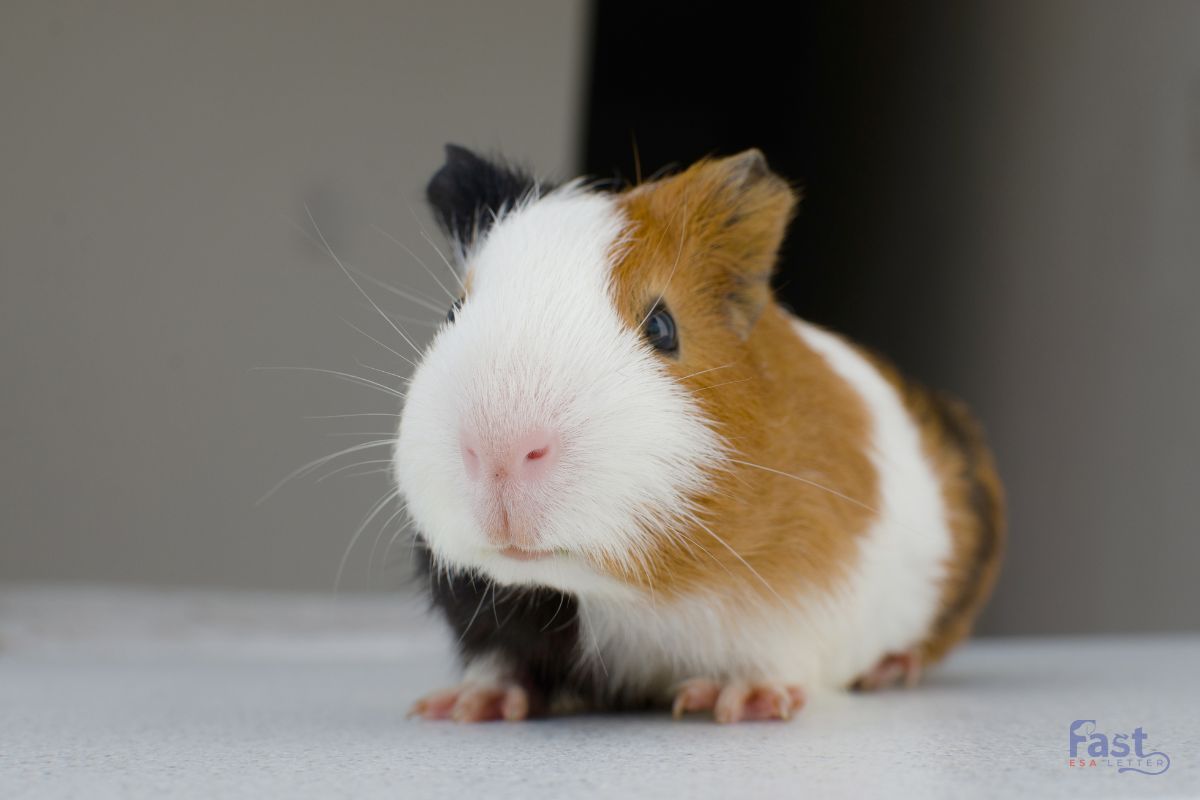Can a Guinea Pig Be An Emotional Support Animal?

Robert Clendenin, MD
When most people think of Emotional Support Animals (ESAs), their minds probably jump to loyal dogs or affectionate cats. But what about smaller, less conventional pets like guinea pigs? These charming little creatures have been winning hearts with their playful personalities and gentle natures. So, can a guinea pig truly serve as an ESA?
In this blog, we’ll explore the role of emotional support animals, delve into the unique qualities of guinea pigs, and determine whether these pint-sized friends can offer the emotional support that many people need.

Key Points
- Guinea pigs can be emotional support animals.
- To serve as an ESA, your guinea pig doesn’t need any special training.
- Their benefits include low maintenance and compact size.
- Their challenges include a short lifespan and limited interaction with owners.
- To get a guinea pig as emotional support animals, you need an ESA letter from a licensed healthcare professional.
- Apart from the ESA letter, you don’t need to register your emotional support guinea pig anywhere.
How Are Animals Legally Eligible to Be Emotional Support Animals?
Generally, ESAs can be any type of domesticated animal, provided they offer significant emotional support and are suited to the needs of the person seeking help. Most commonly, dogs and cats are recognized as ESAs due to their ability to form strong bonds with their owners and offer consistent companionship. However, other animals, such as rabbits, birds, and even miniature horses, can also serve as ESAs if they meet the criteria of providing emotional relief. The key factor is that the animal must be well-behaved and able to assist its owner in managing emotional or mental health issues rather than performing specific tasks or duties.
Did you know?
Guinea pigs are domesticated rodents belonging to the family Caviidae.
What Healthcare Professionals Say About Guinea Pigs as Emotional Support Animals?
Healthcare professionals generally recognize that ESAs can play a crucial role in helping individuals manage mental and emotional health conditions. Guinea pigs are domesticated animals known for their gentle and social nature, which makes them potential candidates for providing emotional support. While they may not be as common as dogs or cats in this role, their affectionate behavior and ability to bond with their owners can offer emotional comfort and companionship. If a guinea pig meets the specific needs of an individual and provides significant emotional support, it can be recognized as an emotional support animal.
Benefits Of Getting a Guinea Pig as An ESA
Getting a guinea pig as an emotional support animal offers several benefits:
- The Comfort of Companionship: Guinea pigs are known for their gentle and social nature. They can provide constant companionship and help alleviate feelings of loneliness and isolation. Their presence can offer a soothing comfort, especially during times of stress or emotional turmoil.
- Alleviate Stress and Anxiety: The presence of a guinea pig can help reduce stress and anxiety. Simply watching them or gently interacting with them can provide a sense of peace and distraction from daily worries. The routine of caring for a guinea pig, such as feeding and grooming, also promotes a feeling of responsibility and purpose, which can further alleviate stress.
- Require Less Space: Guinea pigs don’t need a lot of space compared to larger pets. They can thrive in a well-maintained cage, making them suitable for smaller living environments. Their compact size means they are ideal for apartments, dorm rooms, or homes where space is limited.
- Low Maintenance Needs: Guinea pigs are one of the most low-maintenance emotional support animals you can have. Unlike dogs, they don’t need regular walks, vaccinations, or extensive training. Their diet is simple, and they can enjoy fresh vegetables right from your kitchen.
- Budget-Friendly Choice for Emotional Support: While not entirely free of cost, guinea pigs are generally less expensive to adopt than larger animals such as dogs and cats. Their lower adoption fees, minimal food expenses, and affordable care supplies make them a budget-friendly option for those seeking an emotional support animal without the hefty price tag.
- Non-Allergenic Qualities: For people allergic to more common pets like cats and dogs, guinea pigs might be a more suitable option, as they tend to cause fewer allergic reactions. Additionally, guinea pigs produce less saliva and skin flakes, both of which are common sources of allergens in other animals.
Did you know?
Despite their name, guinea pigs are not pigs, nor do they come from Guinea. They are native to the Andes in South America.
Challenges of Getting a Guinea Pig For Emotional Support Needs
- Limited Interaction: Guinea pigs are less interactive than dogs or cats, which might limit the emotional support they can provide. They don’t engage in the same level of bonding or physical comfort, which could be a drawback for individuals seeking a more direct emotional connection.
- Loud Environments Can Affect Guinea Pigs: Guinea pigs can be sensitive to loud noises and sudden movements, which might make them more anxious and less comforting in stressful environments. Their heightened sensitivity can cause them to become startled or stressed, leading to nervous behaviors such as hiding or freezing.
- Need Pair to Thrive: Guinea pigs are social animals and thrive better in pairs or groups. This means you might need to adopt more than one, increasing the responsibility and care costs.
- Shorter Lifespan: Guinea pigs live 5-6 years, which is shorter compared to other common ESAs like dogs and cats. The loss of a guinea pig might come sooner than expected, which could be emotionally challenging for the owner.
- Guinea Pigs Are Naturally Shy and Need Time to Build Trust: Guinea pigs are naturally shy and cautious animals. It may take some time for them to become comfortable and trusting around you, requiring patience and gentle interaction to build a bond.
- Sharp Teeth: Guinea pigs have strong, sharp teeth that can deliver a painful bite if they feel threatened or scared. While they are generally gentle, handling them properly and understanding their body language is crucial to avoid getting bitten.
Did you know?
Guinea pigs are strict herbivores. Their diet mainly consists of hay, fresh vegetables, and a small amount of fruit.
How Do You Get an Emotional Support Guinea Pig?
You need to obtain an ESA letter for your guinea pig from a licensed healthcare professional. This letter must confirm that your guinea pig is essential for your emotional well-being and that its presence helps alleviate symptoms related to your mental or emotional condition. Once you have the ESA letter, you can enjoy certain housing rights. To get an ESA letter for your guinea pig, follow these steps:
Step 1: Appointment
Schedule an appointment with a licensed mental health professional (LMHP).
Step 2: Consultation
Consult with the LMHP via audio or video call. During this consultation, the professional will examine your needs for an emotional support guinea pig.
Step 3: Approval
Once approved, your ESA letter will be delivered directly to your email.
Can I Get an ESA Letter for My Guinea Pig Online?
Guinea pigs cannot produce vitamin C on their own, so they require a vitamin C supplement in their diet to prevent deficiencies.
Do I Also Need to Register My Guinea Pig for More Legal Protection?
You don’t need to register your emotional support guinea pig with any government or private database for more legal protection. In fact, there is no such requirement or database available for ESA registration. Your ESA letter from a licensed healthcare professional is all you need to assert your rights under the Fair Housing Act (FHA). Be cautious of online services that claim to offer ‘ESA registration’ as it is not legally necessary or recognized by law.
Does My Landlord Have the Authority to Restrict My Emotional Support Guinea Pig?
Your landlord must adhere to the Fair Housing Act, a federal law that allows you to live with your emotional support guinea pig. This law requires landlords to provide reasonable accommodations for tenants with emotional support animals, even if the property has a ‘no pets’ policy. While they generally cannot deny your request, they might do so if the animal poses a direct threat to others or causes significant property damage.
If they restrict your guinea pig even after you provide an ESA letter, you can resolve the issue by discussing the situation calmly with your landlord and providing any additional documentation they might request. If the issue persists, you can file a complaint with the U.S. Department of Housing and Urban Development (HUD) or seek legal advice from an attorney specializing in housing law.
Guinea pigs are quite vocal and use a variety of sounds to communicate. They can make purring, squealing, and chirping noises to express different emotions and needs.
Do I Need to Train My Guinea Pig to Become an Emotional Support Animal?
Your guinea pig doesn’t need special training to become an ESA. The basic role of an ESA is to provide emotional support and comfort to help you cope with your medical conditions. However, basic obedience training is necessary for your guinea pig to serve better for you and fulfill the role of an emotional support animal. This includes:
- A Guinea Pig Must Know Where to Litter: Teaching your guinea pig to use a specific area for its bathroom needs can make care easier and reduce mess.
- A Guinea Pig Must Be Socialized: Ensuring your guinea pig is comfortable with being handled and enjoys human interaction will enhance its ability to provide emotional comfort.
- A Guinea Pig Must Know Their Routines: Training your guinea pig to recognize feeding times, playtime, and other daily routines can create a sense of stability and predictability, which can be comforting for both you and your pet.
What Is the Cost of Getting an Emotional Support Guinea Pig?
The cost of getting an emotional support guinea pig includes several factors. First, the adoption fee costs you around $50, depending on where you adopt from. Additionally, obtaining an ESA letter generally costs about $149. The cost for these essentials can vary depending on the brand and quality you choose, but a good estimate is around $200. Keep in mind that you’ll also have ongoing expenses for food, bedding, and occasional vet visits.
Did you know?
Guinea pigs are sensitive to heat and can easily overheat. Keeping their environment cool and well-ventilated is important, especially in warm weather.
Bottom Line
Frequently Asked Questions (FAQs)
Can I Fly with a Guinea Pig?
You can fly with a guinea pig, but it’s important to check the airline’s specific pet policies before your trip. Airlines like American Airlines and Frontier Airlines allow it, while others do not. Additionally, most airlines have guidelines regarding the transportation of small animals. Be prepared for potential additional fees and requirements, such as health certificates from a veterinarian.
Can Guinea Pigs Be Service Animals?
Guinea pigs cannot be classified as service animals under the Americans with Disabilities Act (ADA). Service animals are defined as animals, specifically dogs and sometimes miniature horses, trained to perform specific tasks related to a disability. Guinea pigs do not meet this definition and are not trained to perform such tasks.
Are Guinea Pigs Good Emotional Support Animals?
Can I Take My Guinea Pig with Me to All Places if It’s an Emotional Support Animal?
Can a Guinea Pig Be an Emotional Support Animal For Children?
Can I Have More Than One Emotional Support Guinea Pig?
Post Author
Prince Sharma
Related Articles
How Emotional Support Animals Help Veterans Reclaim Peace After Service?
How Emotional Support Animals Help Veterans Reclaim Peace After Service?Emotional Support Animals (ESAs) offer comfort and stability to veterans coping with PTSD, anxiety, and depression. They support veterans in rebuilding emotional resilience,...
Think Your ESA Is Illegal? These Laws May Surprise You.
Think Your ESA Is Illegal? These Laws May Surprise You.Breed restrictions do not typically apply to Emotional Support Animals (ESAs) under the Fair Housing Act (FHA). Landlords must accommodate ESAs regardless of breed, as long as they have proper...
Can A Hamster Be An Emotional Support Animal?
Can A Hamster Be An Emotional Support Animal?Yes, a hamster can serve as an emotional support animal (ESA). These small, low-maintenance pets can provide significant emotional comfort and companionship for individuals dealing with mental or emotional...
Live Free with Your ESA!
An ESA Letter Unlocks Freedom!







